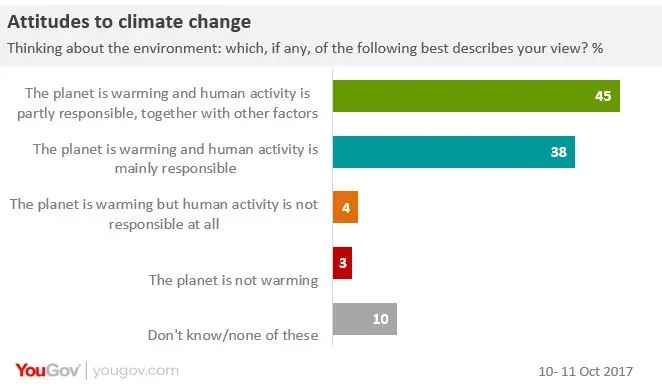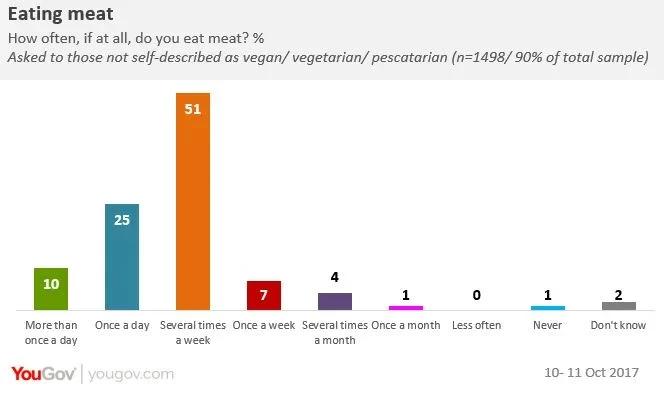As YouGov-Cambridge polling suggests, we're a nation of meat-loving environmentalists
So it’s good news and bad news for environmentalists, according to recent polling on British environmental attitudes to climate change by the YouGov-Cambridge Centre.
We are a nation of budding environmentalist, it seems, with 87% saying they tend to recycle their household rubbish always (69%) or often (18%), and a similar portion (86%) who report that they always (62%) or often (24%) use their own carrier bags when shopping. A majority of respondents also claim they always or often choose energy-efficient appliances when replacing old ones (59%) and switch off electrical appliances instead of leaving them on standby (54%).
These results fit the wider picture of public attitudes to climate change, with 83% saying they believe the planet is warming and that human activity is either mainly (38%) or partly (45%) responsible.

By a similar token, most British voters (76%) think the United Kingdom should remain party to the Paris Climate Change Agreement, despite American withdrawal from it earlier this year. Hence, if the anti-establishment vogue of US President Donald Trump holds some appeal among the British electorate, his climate change scepticism generally doesn't.
But it's not all good news for the environmentally concerned.
The livestock sector has been estimated to account for more greenhouse gas emissions than the entire transport sector combined. Chatham House duly spoke for a growing lobby of concern in a 2015 report when it called the appetite for meat "a major driver of climate change" and warned that "reducing global meat consumption will be critical to keeping global warming below the ‘danger level’ of two degrees Celsius".
In which case, this lobby has its work cut out with the British public, for we do like our meat. Just 9% of the sample described themselves as vegetarian (5%), vegan (1%) or pescatarian (3%). Among the remaining 90%, 86% of these reported eating meat several times a week or more, including a quarter who eat it daily and 10% eating it even more than once a day.

As previous research has suggested, voters may overestimate how green they really are, perhaps owing to a mixture of unawareness and the value-action gap – i.e. the difference between what we preach and practice.
There is little doubt the British public put strong emphasis on individual action in this context. When asked what they think is important or otherwise to protecting the environment, more respondents chose "individuals changing how they live" and "businesses changing how they operate" (both 83%) than either "agreements by the international community" (76%) or "awareness campaigns by environmental organisations" (73%).
The green movement has seen enormous growth over the past two decades, now commonly percieved as social orthodoxy by individuals, companies and governments the world over. But if meat rich diets are the next major obstacle to reducing carbon emissions, could it be the West has only so far picked the low-hanging fruit in terms of lifestyle adjustment?
Methodology: fieldwork was conducted online between 10–11 October, 2017, with a total sample of 1680 British adults. The data have been weighted and results are representative of all British adults aged 18 or over.









